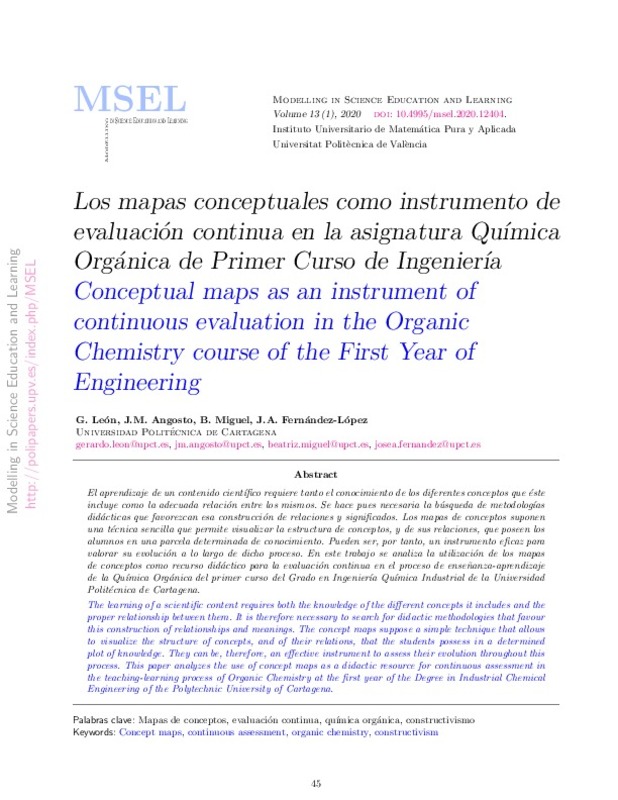Ausubel, D. P. (2000). The acquisition and retention of knowledge: A cognitive view. Boston: Kluwer Academic Publishers. 212 pp. https://doi.org/10.1007/978-94-015-9454-7
Feldine, J. (1983). "Concept mapping: A method for detection of possible student misconceptions". In Helm, H.; Novak, J.D. Proceedings of the International Seminar on Misconceptions in Science and Mathematics. Ithaca (USA): Cornell University Press.
Glenn W. Ellis, Al Rudnitsky, Becky Silverstein. Using Concept Maps to Enhance Understanding in Engineering Education. Int. J. Eng. Ed., 2004, 20, 1012-1021.
[+]
Ausubel, D. P. (2000). The acquisition and retention of knowledge: A cognitive view. Boston: Kluwer Academic Publishers. 212 pp. https://doi.org/10.1007/978-94-015-9454-7
Feldine, J. (1983). "Concept mapping: A method for detection of possible student misconceptions". In Helm, H.; Novak, J.D. Proceedings of the International Seminar on Misconceptions in Science and Mathematics. Ithaca (USA): Cornell University Press.
Glenn W. Ellis, Al Rudnitsky, Becky Silverstein. Using Concept Maps to Enhance Understanding in Engineering Education. Int. J. Eng. Ed., 2004, 20, 1012-1021.
Hagell, P., Edfors, E., Hedin, G., Westergren, A. Group concept mapping for evaluation and devel-opment in nursing education. Nurse Educ. Pract., 2016, 20, 147-153. https://doi.org/10.1016/j.nepr.2016.08.006
Kelly, G.A. (1955). The psychology of personal constructs. New York: Norton & Co. Inc. 556 pp.
Kiliç, M., Çakmak, M. Concept maps as a tool for meaningful learning and teaching in chemistry education. Int. J. New Trends Educ.Implicat., 2013, 4, 152-164.
Lopez, E., Kim, J., Nandagopal, K., Cardin, N., Shavelson, R. J., Penn, J. H. Validating the use of concept-mapping as a diagnostic assessment tool in organic chemistry: Implications for teaching. Chem. Educ. Res. Pract., 2011, 12, 133-141. https://doi.org/10.1039/C1RP90018H
McClure, J.R., Sonak, B., Suen, H.K. Concept map assessment of classroom learning: reliability, validity and logistical practicality. J. Res. Sci. Teach., 1999, 36, 475-492. https://doi.org/10.1002/(SICI)1098-2736(199904)36:4<475::AID-TEA5>3.0.CO;2-O
Mejri, A., Ghannouchi, S.A., Martinho, R.. Representing Business Process Flexibility using Concept Maps. Proced, Comp. Sci., 2016, 100, 1260-1268. https://doi.org/10.1016/j.procs.2016.09.164
Novak, D., Gowin, D.B. (1988) Aprendiendo a aprender. Ed. Martínez Roca S.A. Barcelona. 228 pp.
Öçal, M.F., Güler, G. Pre-service mathematics teachers' views about proof by using concept maps. Proced. Social Behav. Sci., 2010, 9, 318-323. https://doi.org/10.1016/j.sbspro.2010.12.157
Robinson, W.R. A view from the science education research literature: Concept map assessment of classroom learning. J. Chem. Educ., 1999, 76, 1179-1180. https://doi.org/10.1021/ed076p1179
Ruiz Primo, M.A,; Shavelson, R.J. Problems and issues in the use of concept maps in science assessment. J. Res. Sci. Teach., 1996, 33, 569-600. https://doi.org/10.1002/(SICI)1098-2736(199608)33:6<569::AID-TEA1>3.0.CO;2-M
Taşkin, M., Pepe, H., Taşkin, C., Gevat, C., Taşkin, H. The effect of concept maps in teaching sportive technique. Proced. Soc. Behav. Sci., 2011, 11, 141-144. https://doi.org/10.1016/j.sbspro.2011.01.049
Torre, D. M., Durning, S. J., Daley, B. J. Twelve tips for teaching with concept maps in medical education. Medical Teacher, 2013, 35, 201-208. https://doi.org/10.3109/0142159X.2013.759644
Turan-Oluk, N., Ekmekci, G. The effect of concept maps as individual learning tool on the success of learning the concepts related to gravimetric analysis. Chem. Educ. Res. Prac., 2018, 19, 819-833. https://doi.org/10.1039/C8RP00079D
Watson, M.K, Pelkey, J., Noyes, C., Rodgers, M. Assessing impacts of a learning-cycle-based module on students' conceptual sustainability knowledge using concept maps and surveys. J. Clean. Product., 2016, 133, 544-556. https://doi.org/10.1016/j.jclepro.2016.04.063
Willerman, M., Mac Harg, R.A. The concept map as an advance organizer. J. Res. Sci. Teach., 1991, 28, 705-711. https://doi.org/10.1002/tea.3660280807
[-]








